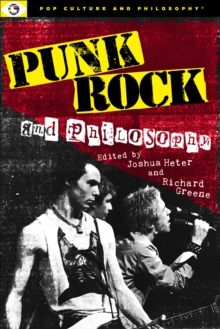Description
| Product ID: | 9781637700228 |
| Product Form: | Paperback / softback |
| Country of Manufacture: | GB |
| Series: | Pop Culture and Philosophy |
| Title: | Punk Rock and Philosophy |
| Authors: | Author: Joshua Heter, Richard Greene |
| Page Count: | 346 |
| Subjects: | Popular music, Punk, New Wave & Indie |
| Description: | “All that is solid melts into air, all that is holy is profaned, and man is at last compelled to face with sober senses, his real conditions of life, and his relations with his kind.” Karl Marx might have been thinking of punk rock when he wrote these words in 1847, but he overlooked the possibility that new forms of solidity and holiness could spring into existence overnight. Punk rock was a celebration of nastiness, chaos, and defiance of convention, which quickly transcended itself and developed its own orthodoxies, shibboleths, heresies, and sectarian wars. Is punk still alive today? What has it left us with? Does punk make any artistic sense? Is punk inherently anarchist, sexist, neo-Nazi, Christian, or—perish the thought—Marxist? When all’s said and done, does punk simply suck? These obvious questions only scratch the surface of punk’s philosophical ramifications, explored in depth in this unprecedented and thoroughly nauseating volume. Thirty-two professional thinkers-for-a-living and students of rock turn their x-ray eyes on this exciting and frequently disgusting topic, and penetrate to punk’s essence, or perhaps they end up demonstrating that it has no essence. You decide. Among the nail-biting questions addressed in this book:? Can punks both reject conformity to ideals and complain that poseurs fail to confirm to the ideals of punk?? How and why can social protest take the form of arousing revulsion by displaying bodily functions and bodily abuse?? Can punk ethics be reconciled with those philosophical traditions which claim that we should strive to become the best version of ourselves?? How close is the message of Jesus of Nazareth to the message of punk?? Is punk essentially the cry of cis, white, misogynist youth culture, or is there a more wholesome appeal to irrepressibly healthy tendencies like necrophilia, coprophilia, and sadomasochism?? In its rejection of the traditional aesthetic of order and complexity, did punk point the way to “aesthetic anarchy,” based on simplicity and chaos?? By becoming commercially successful, did punk fail by its very success?? Is punk what Freddie Nietzsche was getting at in The Birth of Tragedy, when he called for Dionysian art, which venerates the raw, instinctual, and libidinous aspects of life? “All that is solid melts into air, all that is holy is profaned, and man is at last compelled to face with sober senses, his real conditions of life, and his relations with his kind.” Karl Marx might have been thinking of punk rock when he wrote these words in 1847, but he overlooked the possibility that new forms of solidity and holiness could spring into existence overnight. Punk rock was a celebration of nastiness, chaos, and defiance of convention, which quickly transcended itself and developed its own orthodoxies, shibboleths, heresies, and sectarian wars. Is punk still alive today? What has it left us with? Does punk make any artistic sense? Is punk inherently anarchist, sexist, neo-Nazi, Christian, or—perish the thought—Marxist? When all’s said and done, does punk simply suck? These obvious questions only scratch the surface of punk’s philosophical ramifications, explored in depth in this unprecedented and thoroughly nauseating volume. Thirty-two professional thinkers-for-a-living and students of rock turn their x-ray eyes on this exciting and frequently disgusting topic, and penetrate to punk’s essence, or perhaps they end up demonstrating that it has no essence. You decide. Among the nail-biting questions addressed in this book: ● Can punks both reject conformity to ideals and complain that poseurs fail to confirm to the ideals of punk? ● How and why can social protest take the form of arousing revulsion by displaying bodily functions and bodily abuse? ● Can punk ethics be reconciled with those philosophical traditions which claim that we should strive to become the best version of ourselves? ● How close is the message of Jesus of Nazareth to the message of punk? ● Is punk essentially the cry of cis, white, misogynist youth culture, or is there a more wholesome appeal to irrepressibly healthy tendencies like necrophilia, coprophilia, and sadomasochism? ● In its rejection of the traditional aesthetic of order and complexity, did punk point the way to “aesthetic anarchy,” based on simplicity and chaos? ● By becoming commercially successful, did punk fail by its very success? ● Is punk what Freddie Nietzsche was getting at in The Birth of Tragedy, when he called for Dionysian art, which venerates the raw, instinctual, and libidinous aspects of life? |
| Imprint Name: | Open Universe |
| Publisher Name: | Carus Books |
| Country of Publication: | GB |
| Publishing Date: | 2022-10-06 |


